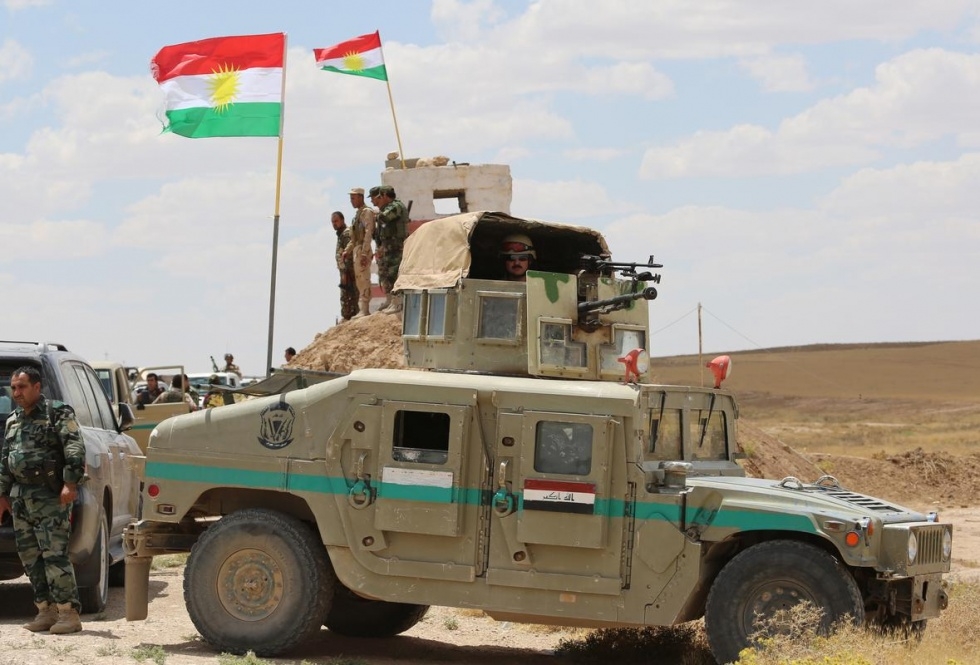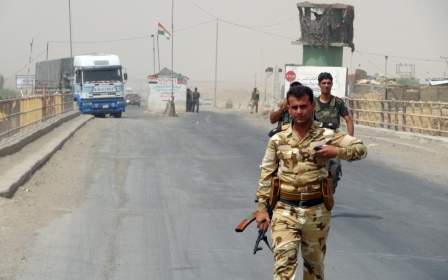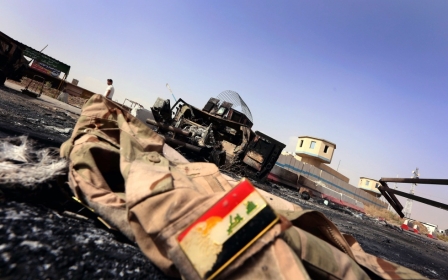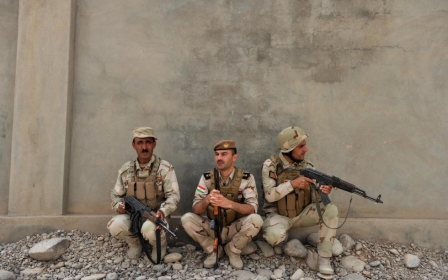New borders no panacea for Iraq crisis

It is not necessary to delve too deep into Iraq’s history to understand the crisis today - one need only look into the last decade of a century-old order created by the 1916 Sykes-Picot agreement.
Eighty-seven years after that agreement dismembered the Ottoman Empire, Iraq’s occupation by the United States in 2003 launched a new era in the Middle East. The US, intentionally or not, activated political fault lines in the region.
A second turning point was after so-called elections and a constitutional referendum in 2005, but the critical point before the current crisis took place after 7 March, 2010 elections. Iraq’s political structure, which had been held together by force until that vote, fell apart.
With the election, an ethnic-sectarian political template was realised at the expense of the political structure.
Iraq’s only hope to overcome the ethnic-sectarian political template that had been imposed on it was the al-Iraqiya List, the first political party in Iraq’s history to represent the diversity of the region to such an extent.
Despite the fact that the al-Iraqiya List won the elections, in a scheme necessitated by the US-Iran relations with the Kurds’ passive support, governance of the country was transferred to Prime Minister Nuri al-Maliki.
As a result, not only was an elected political party prevented from governing the country, but any meaning elections might have carried in Iraq was effectively lost.
After this fateful vote the political experience in Iraq was not seen as a democratically elected government, but a vicious cycle of governments determined by ethnic and sectarian affiliations.
It is the political template that was imposed on Iraq that caused the problems it is having both with the minority groups within its borders and its neighbors.
Maliki, since the day he came to power, has roughly moved along two major axes. First, he uses any minor crisis as an excuse to use the sectarian discourse as ammunition and second, he approaches every problem from a security perspective.
Iraq and the Kurds
The fall of Mosul to the Islamic State (IS) in June brought Iraq to the forefront of international attention once again. Ironically, Iraq had not received this much attention even when it was experiencing bloodier episodes in 2012. Had more attention been paid to Iraq when close to 5,000 people a month were dying, there would be no need to talk about IS today.
The distorted political order of 2010, brought about by the 2003 invasion, actually paved the way to what is happening in Iraq today. Nevertheless, various political actors under serious threat today are as much to blame for the current conditions as the invading forces.
The Sunni Arabs, having seriously suffered in the debris Saddam Hussein left behind, were paralysed by the US invasion. The longer they took to produce a political entity with clear parameters, the more opportunity the armed Salafis had to fill the power vacuum.
Another important actor to share the blame was the Iraqi Kurdistan Regional Government. There were both advantages and disadvantages of this region gradually becoming more independent from the central government after the invasion. It sought a way out of the comfort zone in which it had been trapped for the last 10 years while trying to find a compromise with the central government.
The “Kurdish entity” that emerged as a result of both the invasion of Iraq and the uprisings in Syria became the source of both exaggerated fears and expectations. These fears and expectations, which amounted to the same fears and expectations raised by the Sykes-Picot deal, blocked any sound analysis or discussion of the issue.
Those who relied on exaggerated fears perceived every development as another step towards “division and separation”, taking it as far as demonising the Kurds at times.
Those who relied n exaggerated expectations, in neo-Sykes-Picot-like aspirations completely detached from the realities of Mesopotamian geopolitics, made anachronistic political moves.
The order and borders imposed by Sykes-Picot were perceived as gains for the Kurds, for the region, it really meant fragmentation and weakening. Such a perception fails to show the maturity to question what the regional actors other than Kurds gain from a Sykes-Picot order.
Under circumstance where one’s loss is perceived as the other’s gain, history and the political are condemned to become the first victims. The peoples of the region, regardless of how the borders in the region were drawn after World War I, were the ones who lost.
Speculating just what kinds of conflicts would have emerged, had the Sykes-Picot agreement given the Kurds a nation state is a useful mental exercise to comprehend the century old turmoil in the region.
Without a doubt, there will be those who perceive the analysis offered above as “century old excuses” constructed especially for the Kurds. However, it is necessary to recognize that there are only two ways out of this predicament: We either offer objective analyses in the quest for a “new order” in which all groups are real actors, or we fall prey to the century old truisms of the status quo and find ourselves hoping for the repetition of disasters we have already been through.
Every minute the crisis in Iraq intensifies is another minute the fragmentation of the region along ethnic-sectarian lines becomes a greater possibility. What has drawn the world’s attention with the fall of Mosul is not the Iraqi crisis as much as potential disintegration of Iraq.
This is nothing new. From the Kurds’ perspective, the de facto separation since the Gulf War has become an unmanageable chaos after the invasion. In other words, the choice between maintaining Iraqi borders as they have been drawn by Sykes-Picot with minor updates and the disintegration of the region, each with its own cost, is no choice at all. The occupation of Iraq and policies followed in the region after the occupation have already caused enough damage to the possibility of building a common ground that could offer political unity to the different groups in Iraq.
Iraq’s political unity
First of all, we need to search for an answer to this question: To what extent is political unity in Iraq a possibility? The post-Saddam constitution drafted haphazardly by the occupation government in 2005 damaged the political unity to a great extent.
A perfect microcosm of the situation in Iraq, the Kirkuk status referendum marked a historical mistake. The Iraqi constitution, adopted by a referendum on October 15, 2005 contained a last minute provision—Article 140, written explicitly to resolve the Kirkuk issue.
In 2005, the bloodiest year under occupation, before the de facto political conditions of the region could reach an acceptable level of participation and normalization, the new constitution was put to a referendum. The referendum, marked by low participation, functioned more as the institutionalization of the ethnic-sectarian template that rendered all politics meaningless, than a constitutional plebiscite.
The moment the Kirkuk conflict resolution plan was written was also the moment that made such resolution impossible. Immediately after the article was introduced, all actors began to focus all their energies on the second phase. The result was clearly a disaster. The struggle to gain footing for the second phase prevented the first phase, the normalization of the region, from being accomplished. Had an improvement been made on the Kirkuk issue, even a basic compromise acceptable to all parties, the crisis in Iraq would not be where it is today.
Similar things can be said for the shaping of the Iraqi central government. That is to say, no progress was made either at central or regional levels. Clearly the Kurds’, Turkmens’ and the Sunni Arabs’ Sykes-Picot trauma as well as the Shiites’ centuries old “political hunger” played an important role in the turn of events.
At this point, there are three harsh facts to be noted in relation to Iraq’s political unity. First, a new constitution that regulates all political differences as well as the distribution of energy income - the only economic resource of the country - needs to be drafted.
This will be no easy task. In fact, other than Kurds who have been trapped in their own world of 36th Parallel North, there are no other groups that would benefit from decentralization and could share the oil revenue.
Not to mention, the Kurds and Iraqi Kurdistan have their share of serious problems under the current conditions. All those who fall outside the Kurdistan region, first, need to become potential actors to participate both in politics and economics. That is to say, the complex nature of any answer to the question just how the Arabs (both Shiite and Sunni) and Turkmens (both Shiite and Sunni) will share the income, through what institution and towards what end is enough to underline the chaos in the region.
This is simply the bitter consequence of the insistence on a political framework that determines status by ethnic and sectarian affiliations. In other words, insisting on the political division of an Iraq that is already physically divided is asking for the impossible.
The second factor is the Kirkuk issue. There is a body of literature on the Kirkuk issue that needs to be taken seriously. After the events in Mosul, evaluating the issue as it had been evaluated after the occupation in 2003 can only result in a disaster.
A de facto solution must be realized in Kirkuk immediately. It should be made clear that Kirkuk is not an issue Kurds or any other minority group can shoulder alone. Similarly, evaluating Kirkuk as an issue or region independent from Iraq, when it is clearly and directly impacted by any crisis experienced in Iraq, can only create problems in the long run. Such an approach has already been tried and failed post 2005.
Bringing Kirkuk under Kurdistan Regional Government creates another set of discussions. It should be remembered that Mosul would play an important role in these discussions. In other words, bringing Kirkuk and Mosul under the KRG politically and demographically as part of a belated nation state project is not an option.
The end result of such an action would be nothing more than a Maliki term in Northern Iraq. The fundamental reason behind this is the impossibility of the Arab and Turkmen populations in these regions being satisfied under a Kurdish government.
The Sunni Issue
The third factor is the biggest issue both in the region and in Turkey, via Iraq -the Sunni crisis.
The issue of the Sunni Arabs had become a priority after the occupation of Iraq. It is this issue that underlies the emergence of organizations do not really have strong grounding in Iraq, such as IS.
The Sunni Arabs’ loss of living space and power fueled the primitive episodes lived in Iraq. Unless some of the demands of the Sunnis in Iraq are satisfied, the Sunni issue will unavoidably merge with the Syrian crisis.
Although it is too late to reverse this process right now, it can still be managed. Whether or not Iran could exercise good judgment in this situation becomes the most crucial question. So far, Iran’s vision, which did not extended beyond keeping Maliki in power in Iraq and Assad in Syria, has only produced more chaos.
This position, which does not serve to protect Iran’s long-term interests in either country, is nothing but blindness brought about by sectarian politics.
It is clear that Turkey will continue to face the Sunni problem at every turn. The Sunnis’ expectations from Turkey, which they had seen as a solution to their problems at differing levels, rose significantly after 2010.
The only way out of this for Turkey is to find a solution that can meet the differing expectations of different Sunni groups. It should also be noted that the Sunnis include Arabs, Turkmens and some Kurds.
While Sunni identity is the primary identity for Arabs, for Kurds and Turkmens it is the ethnic identity that is at the forefront. It is clear that a common Sunni identity does not bind these three groups. This is precisely what I was talking about when I referred to the ethnic sectarian crisis in Iraq.
To put it in conflict resolution terms, the only way out of the current predicament is for the conflicting parties to find a common ground to stand on. If the Sunni groups can manage to mitigate their internal factions and conflict, the Shia-Sunni conflict would certainly diminish.
Organisations such as IS damage the fragile trust forged between parties just as much as the Maliki administration. Allowing Maliki to continue to govern a de facto disintegrated Iraq would only result in production of more chaos springing from Baghdad. If this continues, it is only a matter of time before the same scenario that resulted from the passive support given to Bashar al-Assad play out there.
The first thing to do in Iraq is to make an effort to save the Baghdad centeral government. In fact, unless some sort of order is brought to Baghdad, finding a solution in Kirkuk or Kurdistan will be next to impossible.
Alleviating some of the problems caused by Baghdad may open the necessary space to discuss possibilities for peace for the whole of Baghdad. It is crucial that the Maliki government that came to power in 2006 transfer power to a transition government. This should be the prerequisite to preventing the havoc Assad wreaked in Syria being repeated in Iraq.
Is post-Sykes-Picot a possibility?
It would be unfair to expect any transitional government in Iraq to resolve all conflicts at its outset. In fact, under circumstances in which the parties to the conflict hold the control over their own regions, the kind of transition to occur should be defined clearly.
It should be remembered that the most difficult scenarios to realize in Iraq are projects that rely on ethnic or sectarian “nation state”. It should also be remembered that separation scenarios reiterated every time the crisis flares up in Iraq, in actuality translate into intense economic-political conflict and a lot of bloodshed.
In other words, none of the actors in the region have the capacity to draw neo-Sykes-Picot borders that would be acceptable to all. Unless the solution offered for the region to climb out of its current chaos involves a post-Sykes-Picot plan, the transition process will only last longer and produce more chaos.
Successful transition in Iraq can only happen when Baghdad’s influence over Iraq is assuaged and when a decentralized administration system with a plan for distribution of oil revenue that satisfied all actors is implemented.
The only dynamic that cuts across all segments in Iraq diagonally is oil. As such, any transition should begin by developing a plan for the fair distribution of this revenue.
Another critical issue is the security of the distribution. The Maliki disaster related to this issue has in effect carried Iraq back to 2003. Maliki, having followed Bremmer’s disastrous plan for the military and the government, with his sectarian interventions, created an unmanageable military.
The bloody consequences of this situation, which became painfully clear in Mosul, were first seen in 2012. At this point, it has become exceedingly difficult for the military to bring stability to Sunni Arab regions in Iraq or even exist as an entity anywhere in north Iraq. This is precisely why it has been easy for organizations such IS to fill the power vacuum. A military structure acceptable to all Sunni Arabs, Kurds and Turkmens should be established north of Baghdad.
Finally, contrary to prevalent belief, the KRG’s declaration of independence at this point would not be a simple choice to manage neither for Iraq nor for the region. A scenario in which a belated sense of nationalism governing an ethnic based nation state in which Kirkuk is included is particularly a weak possibility.
In this sense, any transitional framework that involves the Sunni Arabs and Turks of Northern Iraq (Shia Turkmens should be thought of as a separate issue here) should focus more on stability rather than declaration of a new state. Unless the Iraq Kurds plan their future, at least in the intermediate run, with the Sunni Arabs and Turkmens, they will face serious risks.
When all these complex dynamics and the tragic nature of the crisis are considered, a solution in which the regional actors rely on Turkey appears to be a sound scenario. However, from Turkey’s perspective, this would only be strategically important if the Kurds agree to a compromise that includes the Sunni Arabs and Turkmens. Otherwise any such initiative would only remain a short-term trend that does not promise a promise or stability.
Can Iraq be divided?
The idea that new borders can resolve any crisis is not only a Sykes-Picot malady, but does not really correspond to any real politics. The existence of ethnic-sectarian fault lines does not really offer us any insight into the political landscape of separation.
Is it really possible to talk about a political landscape based on ethnic and sectarian entities? Reiterating the geographic areas populated by different groups does not really give us an accurate econo-political distribution of the region.
For a separation scenario to be realized in Iraq, 1. New borders that are near impossible need to be drawn, 2. The resultant two sectarian and one ethnic regions need to be governed, 3. A fair plan for the distribution of the oil revenue that all groups depend on needs to be established and 4. The security of the borders as well as the distributive plan need to be enforced by a military structure.
A debate regarding the geopolitics of separation in Iraq can only take place if the minimum conditions for these for requirements are met. In fact, there is something much bigger at stake. For there to be a separation, there needs to be actors to be divided and to do the dividing.
That is to say, there needs to be entities that could be clearly defined to a certain. For instance, who is a Sunni Arab? Similarly, what is a Shia Arab? Furthermore, how do the Kurds think a region that has a higher ratio of Arabs and Turkmens than the Kurds in Turkey could be governed under the “Kurdish Nation State”?
It is necessary to prepare for a transition period in Iraq that is going to last for years to come. Either the chaos will be intensified by the invention of neo-Sykes-Picot or a scenario in which Baghdad’s role in the system is diminished and a vision of future that involves a fair distribution of oil revenue is strengthened will be implemented.
For this to happen, the Sunni Arabs need to be ‘Kurdified’ a little, the Kurds need to be a little ‘Sunnified’ and a little ‘Turkmenified’. In Iraq, the Sunni Kurds, Sunni Turkmens and Sunni Arabs do not constitute a larger group of Sunnis. This does not appear to be a possibility for the future either. In fact, one way the chaos could intensify in an indivisible Iraq would be the failure of Sunni actors to show their will for a shared future.
Otherwise, each ‘rescued’ region will carry what’s currently Baghdad’s crisis into its own “autonomous region”.
The views expressed in this article belong to the author and do not necessarily reflect the editorial policy of Middle East Eye.
Photo credit: Iraqi Kurdistan is making moves towards independence following the advances by Islamic State (AFP)
New MEE newsletter: Jerusalem Dispatch
Sign up to get the latest insights and analysis on Israel-Palestine, alongside Turkey Unpacked and other MEE newsletters
Middle East Eye delivers independent and unrivalled coverage and analysis of the Middle East, North Africa and beyond. To learn more about republishing this content and the associated fees, please fill out this form. More about MEE can be found here.





